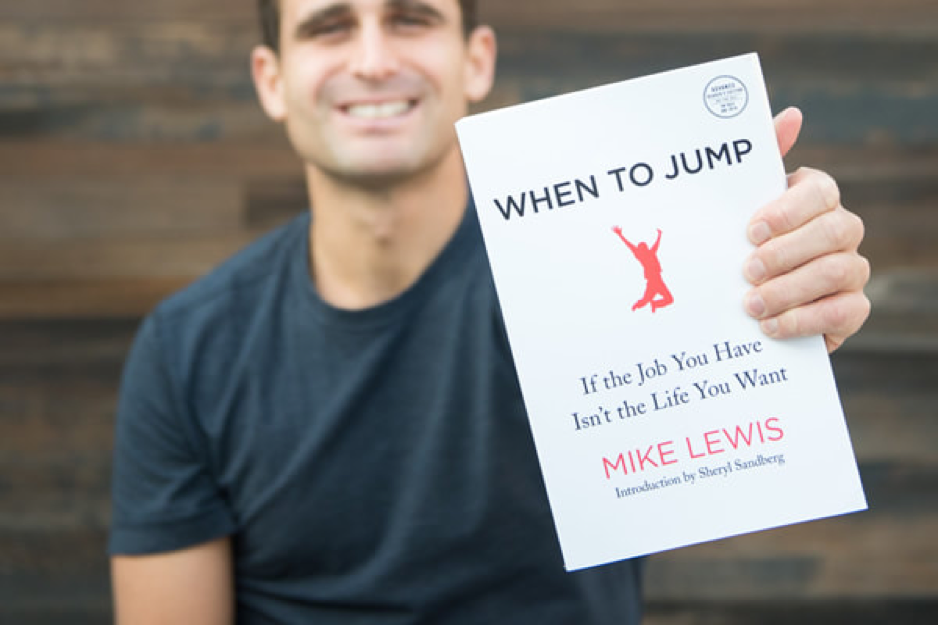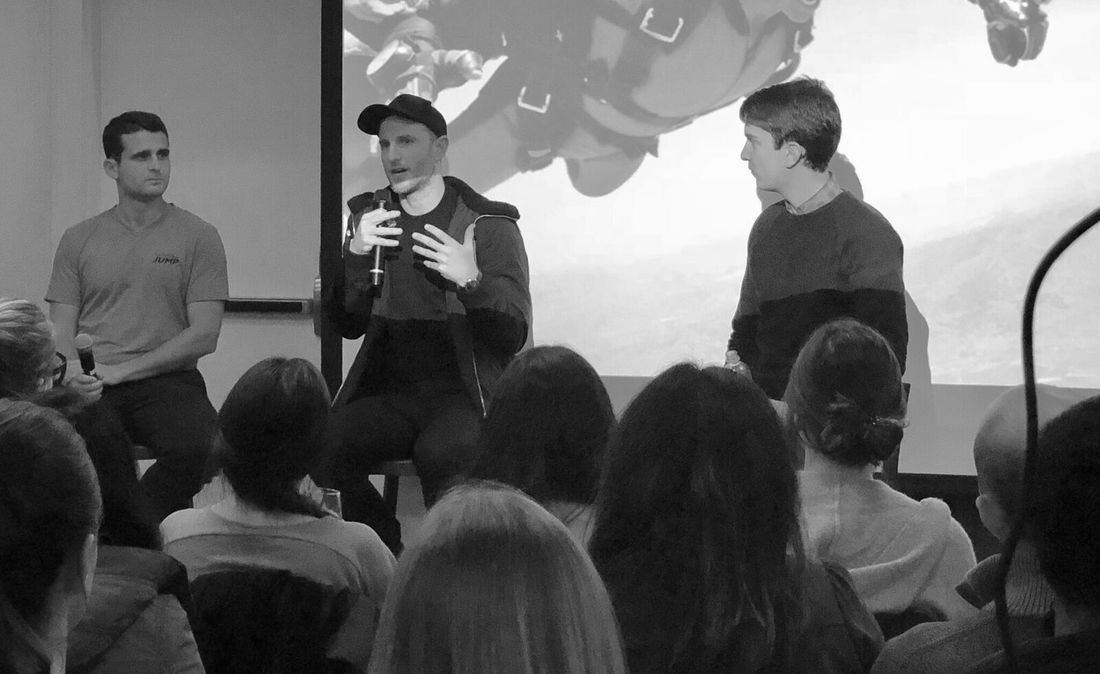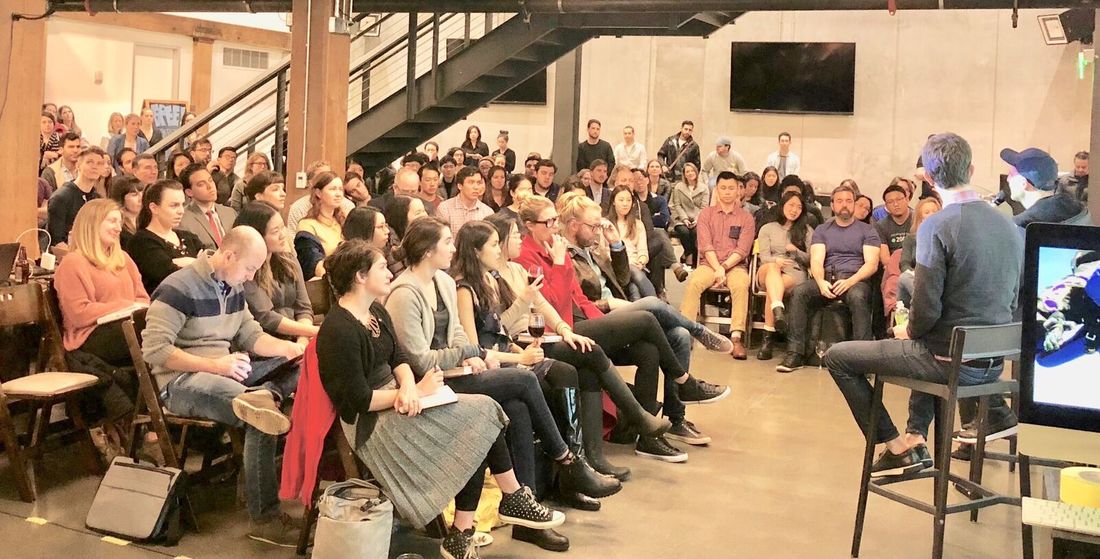What happens and what do you learn when you have the courage, gritty self-talk and resilience to truly take the leap into the life you love? That is the focus of Mike Lewis’ new book When to Jump, which dives into the stories of entrepreneurs and business owners-both big and small- to offer a serious dose of inspiration. We also loved when we found out this “jumper” (as he likes to call it) was launched his podcast and site on Weebly!
We invited Mike to tear into this topic in front of an eager audience (who lined up out the door and around the block) alongside our CEO, David Rusenko, and our friend from up the street, Joe Gebbia, the co-founder and CPO of Airbnb.
In case you missed the full Facebook Livestream of this inspiring discussion chock full of advice that will rally any procrastinator, here are our top 5 takeaways from our When to Jump Fireside Chat.
Stop Planning. Start Doing.
Dave: “It’s not so much about the planning because the world is changing too fast to meticulously plan and then plan for success and then just get started. It’s not version one that is going to be successful, it’s version 27. So if you get started, you start getting user customer feedback. In my view don’t think too much about the planning and just get started and get out there.”
Joe: “Wholeheartedly agree. Perfection is the enemy of progress. You will get stuck in analysis paralysis. It’s too easy to say oh it’s got to be perfect we’ve got to strategize and figure out the market and all this. We never wrote a business plan. Never in our history has a business plan ever existed. It was through iteration. Our planning was us doing. It was us iterating and putting our idea out there and then responding. Like we have an idea and put it out. How are people using it? Ok, it’s different than we thought let’s go this direction. The worst thing you could ever do is get lost in a google doc writing the strategic business plan or doing market research the best thing you can do is get it out there.”
Joe: “Wholeheartedly agree. Perfection is the enemy of progress. You will get stuck in analysis paralysis. It’s too easy to say oh it’s got to be perfect we’ve got to strategize and figure out the market and all this. We never wrote a business plan. Never in our history has a business plan ever existed. It was through iteration. Our planning was us doing. It was us iterating and putting our idea out there and then responding. Like we have an idea and put it out. How are people using it? Ok, it’s different than we thought let’s go this direction. The worst thing you could ever do is get lost in a google doc writing the strategic business plan or doing market research the best thing you can do is get it out there.”
Your enthusiasm is currency
Joe: “I had no money to pay these people. I only had my enthusiasm and your enthusiasm actually is currency. Your excitement about your idea is what will attract others to your idea. When you don’t have anything- you don’t have any product yet, no website yet, there’s maybe not something of substance what I would recommend is that you share your enthusiasm with people because that will attract them to you and that’s how you get your first team members.”
Dave: “I do think that having other team members is critically important. Sharing your enthusiasm is really important. For the most part just look for the smartest people you know and then figure out how to demonstrate to them that you’re serious.”
Dave: “I do think that having other team members is critically important. Sharing your enthusiasm is really important. For the most part just look for the smartest people you know and then figure out how to demonstrate to them that you’re serious.”
It’s not all or nothing
Dave: “You don’t have to be all in on day one because we weren’t. You can spend some time pursuing that idea I think often times people have an idea and don’t get started it’s either all in or nothing and it’s not a binary decision. I like to say that the worst case scenario is you are creating the best resume. There is not as much downside as you think and there is so much upside to putting yourself in the position to be lucky.”
Joe: “My advice to you is to take a next step. It doesn’t mean you have to cut all the cords and jump off a cliff, it just means that you take whatever that tiny little next step is. What is important is getting in the gym of entrepreneurship. Because it’s not like you wake up all of a sudden and start a company, it’s the same that you don’t wake up one day and run a marathon all of a sudden. It’s something you train for. It’s the same thing with entrepreneurship, the cool thing is that you can’t start right now tonight to get into the gym of entrepreneurship. It doesn’t have to be scary, big or huge financial commitment.”
Joe: “My advice to you is to take a next step. It doesn’t mean you have to cut all the cords and jump off a cliff, it just means that you take whatever that tiny little next step is. What is important is getting in the gym of entrepreneurship. Because it’s not like you wake up all of a sudden and start a company, it’s the same that you don’t wake up one day and run a marathon all of a sudden. It’s something you train for. It’s the same thing with entrepreneurship, the cool thing is that you can’t start right now tonight to get into the gym of entrepreneurship. It doesn’t have to be scary, big or huge financial commitment.”
If you build it they will (not) come
Joe: “Field of Dreams was the worst thing that happened to entrepreneurs ever in the history of Hollywood. It couldn’t be further from the truth. There is this mythology in Silicon Valley that if you build it they will come, like if you put your idea out into the world on the internet suddenly hold down your servers because everything is going to take off like a rocket ship. That happens in very, very, very, very few use cases. There is one use case I know and that is YouTube. The whole point is if you build it they will not come.”
Dave: “Couldn’t agree more that if you build it they will come is complete bullshit. People think of their ideas as this magical thing that is going to get out there and just wait until he world see sit but what I like to tell people is that it’s not version one that is going to be successful it’s version 27 that’s going to be successful.”
Dave: “Couldn’t agree more that if you build it they will come is complete bullshit. People think of their ideas as this magical thing that is going to get out there and just wait until he world see sit but what I like to tell people is that it’s not version one that is going to be successful it’s version 27 that’s going to be successful.”
Entrepreneurs are not afraid of adversity
Joe: “Here is the lesson: entrepreneurs have the innate ability to turn those hard times into opportunities. To me that is the difference between an entrepreneur and not. You have the ability to look at a challenge and say this isn’t a challenge, this is an opportunity of some kind. To me, anyone who can flip those things and reframe it, to me that’s the essence of entrepreneurship.”
Dave: “I agree that the hard times are the essence of what defines companies and what creates the kernel of culture…. I think honestly it’s waking up everyday and saying we are going to keep going some days you won’t feel like it, it’s like a walking marathon.”
Dave: “I agree that the hard times are the essence of what defines companies and what creates the kernel of culture…. I think honestly it’s waking up everyday and saying we are going to keep going some days you won’t feel like it, it’s like a walking marathon.”



 RSS Feed
RSS Feed